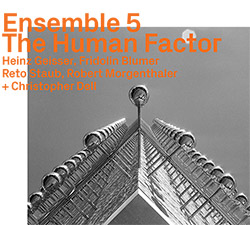
It is said that one year in a dog’s life is equivalent to seven in a human. But what of a jazz musician to an average person? At least seven, if not twenty. As such, that Ensemble 5 has been able to maintain itself for over a decade and now eight albums is quite a feat.
The multi-generational Swiss band, ostensibly under the leadership of percussionist Heinz Geisser (b. 1961), originally was a quintet with trombonist Robert Morgenthaler (b. 1952), pianist Reto Staub (b. 1979) and bassist Fridolin Blumer (b. 1984), plus French saxophonist Vincent Daoud (b. 1978), debuting with the 2011 recording Solstice on Leo. Over the next several years, they would continue as a quartet sans Daoud, releasing six albums also on Leo, two with guests (2016’s Live with saxophonist Elliott Levin and 2019’s Luminescence with violinist Naoki Kita).
With their latest release, Ensemble 5 return home in a sense, to the Swiss label ezz-thetics (under the umbrella of hatHUT), and add another guest, German vibraphonist Christopher Dell, who slots in nicely both age-wise (b. 1965) and aesthetically and was invited to record for two days in the studio with the group after a successful concert earlier in 2022.
As is the case with previous albums, the music of The Human Factor is fully improvised, the seven extemporizations ranging from terse (“Prelude” and “Interlude” coming in at either of side of two minutes) to expansive (four pieces cresting seven minutes). Dell’s role moves from complementing Geisser’s various interjections to adding more harmonic counterpoint alongside Staub.
As would be expected — by now even free improv has some established methodologies — the longer pieces allow for a greater range of tempo, density and volume, heard immediately (and ironically) in the second piece “The End of Predictability”). When Blumer switches to arco, there is a more urgent drive and grittier texture and it is to his credit that Dell is assertive, not feeling like a new cast member thrust upon a long-running ensemble television show. The second longest piece, “Rebirth of The Singular”, dolorous and oozing across its duration, is a highlight of the session, each member nearly daring the others to break the mood of restraint and intent listening.
Comments and Feedback:
|



